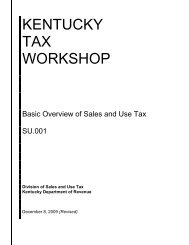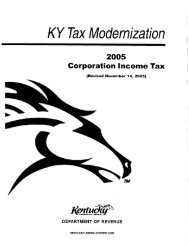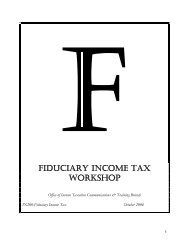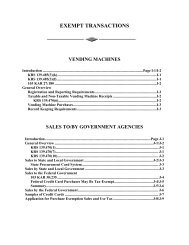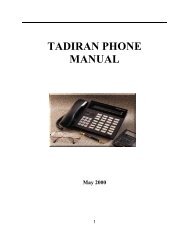administration & accounting - Kentucky: Revenue Employee Website
administration & accounting - Kentucky: Revenue Employee Website
administration & accounting - Kentucky: Revenue Employee Website
Create successful ePaper yourself
Turn your PDF publications into a flip-book with our unique Google optimized e-Paper software.
Treatment of Sales on which Tax is Deleted by Purchaser<br />
If the seller does not timely obtain a resale certificate, the fact that the purchaser deletes the tax<br />
or tax reimbursement from the seller’s billing, provides their permit number to the seller, or<br />
informs the seller that the transaction is not taxable does not relieve the seller from liability for<br />
the tax nor from the burden of proving the sale was for resale. Consequently, when<br />
auditing/reviewing the vendor, assess tax accordingly. However, if auditing/reviewing the<br />
purchaser and it is apparent that the purchaser intended to purchase the item tax-free such<br />
purchaser will be deemed liable for the tax.<br />
Verification of Payment of Use Tax by Purchaser<br />
In those situations where resale certificates have been disallowed and the retailer claims that the<br />
purchaser has paid the use tax directly to the Department of <strong>Revenue</strong>, the field auditor will be<br />
requested to obtain from the retailer a notarized affidavit signed by the purchaser (owner, partner<br />
or officer) stating that it has paid such tax on its sales and use tax return or through audit.<br />
Payment on Return<br />
The signed notarized affidavit will be considered as satisfactory evidence of payment of the tax<br />
unless there is evidence that the contents of the affidavit are incorrect.<br />
Payment Through Audit<br />
The sale will only be deleted from the vendor’s audit upon verification through the Division of<br />
Protest Resolution that the contents of the affidavit are correct.<br />
In addition, if the vendor does not have a resale certificate on file from the purchaser, the<br />
purchaser must include in the affidavit a statement that it will not seek a refund from the<br />
Department of <strong>Revenue</strong> on the basis that the tax was the vendor’s liability. Copies of such<br />
affidavits are to be included in the audit file.<br />
AUDIT PROCEDURE - PURCHASER<br />
Verification That Certificates Were Issued By Purchaser<br />
When a purchaser issues a resale certificate to a seller, the purchaser is certifying in writing that<br />
he will assume any resulting tax liability. As a general rule, verifying the seller has a certificate<br />
on file by telephone is sufficient evidence to hold the purchaser liable for the tax. However, in<br />
light of the decision in Stone Creek Stud, Inc., if after telephone verification, the taxpayer<br />
continues to protest the issue in the audit, it will be necessary to obtain copies of the certificates<br />
in question from the sellers.<br />
S - 15




